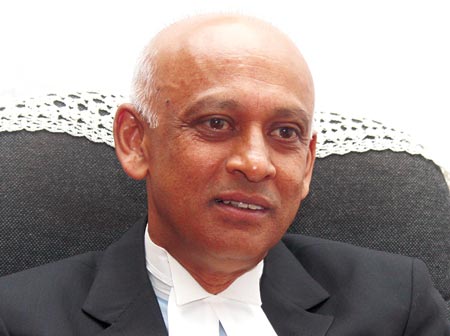At the same time, according to the affidavit, Sir Anerood Jugnauth has been deriving a monthly pension of
Rs 237,400 as former President since he left office on 10 March 2012.
According to barrister Bissessur, as per the provisions of the President’s Emoluments and Pension Act 1992, namely section 4(2): “A retiring President or Vice-President in receipt of a pension under subsection (1) shall not undertake any remunerative employment for the remainder of his life.”
According to barrister Akil Bissessur, “the payment of the current basic monthly salary of Rs 282,000 as personal emoluments to Prime Minister constitutes remunerative employment and is therefore contrary to law.” The affidavit claims that the decision to “continue paying a monthly salary to the Prime Minister is ultra vires and illegal.” Mr Bissessur is asking for a court order barring SAJ from receiving the salary of a PM and for an order compelling SAJ to reimburse all the emoluments he received since December 2014 with interest at the legal rate.
Talking to News on Sunday, Akil Bissessur reveals that he initiated this legal action as a citizen of Mauritius and a taxpayer. He pointed out that this has nothing to do with Labour Party and no one in the party knew that he was going to take a legal action against SAJ.
[[{"type":"media","view_mode":"media_large","fid":"10423","attributes":{"class":"media-image wp-image-18778 alignleft","typeof":"foaf:Image","style":"","width":"196","height":"146","alt":"Raouf-Gulbul"}}]]Raouf Gulbul: “The PM is not an employee”
Barrister Raouf Gulbul affirms that the PM is not by definition an employed person. “The question that we must ask is whether a Prime Minister who is elected by the people can be considered as an employee. The Prime Minister is not an employee. He is elected by the people following a general election and hence, he becomes the representative of the people, appointed by the President to assume the responsibility of a Prime Minister. He is exercising the rights conferred upon him by the Constitution,” he says. He further explains that “when we refer to an employee, we think of a job contract with a scheme of duties, accountability towards the employer, and working hours. But is the PM bound by an employment contract? Does he have a scheme of duties? Does he have to be accountable to any employer or be on duty from 9 am to 5 pm?”, he questions. According to the lawyer, the PM is not an employee of the State either but rather, he has been elected by the people. “The PM is also not employed by the people. He is discharging the office of the PM,” he adds. Raouf Gulbul also wonders whether lawyer Akil Bissessur has the ‘locus standi’ to bring the matter before a court of justice.
[[{"type":"media","view_mode":"media_large","fid":"10424","attributes":{"class":"media-image wp-image-18779 alignleft","typeof":"foaf:Image","style":"","width":"220","height":"160","alt":"Yousuf-Mohamed"}}]]Yousuf Mohamed: “The PM is an employee”
Barrister Yousuf Mohamed confidently states that the Prime Minister is an employee. “If the Prime Minister is receiving a salary or compensation, like every employee, why is he not one? For instance, if you look at the last Budget, under the section personal emoluments and basic salary, you will find that the Prime Minister figures at the top of the list. So he is considered as an employee,” he says. Furthermore, he explains that under the PEPA 2012, a retiring President or Vice-President in receipt of a pension under section (1) shall not undertake any remunerative employment.
“The law is straightforward. Someone benefiting from a pension cannot undertake a remunerated employment. The PM cannot receive the pension as former President while at the same time enjoying the salary of a Prime Minister. It is against the law. The same applies for the privileges. He cannot enjoy the privileges of a former President when he currently holds the office of Prime Minister,” states the barrister. “At no point are we challenging the office of the Prime Minister. He can continue staying in office. Our main contention is that he cannot receive the pension and the salary together. It should be either one but not both,” he maintains. Regarding the question of whether Akil Bissessur has the ‘locus standi’ to initiate the legal challenge, Yousuf Mohamed states: “As a citizen of Mauritius and a taxpayer, the latter has the right to have recourse to a court of justice.”
[[{"type":"media","view_mode":"media_large","fid":"10425","attributes":{"class":"media-image wp-image-18777 alignleft","typeof":"foaf:Image","style":"","width":"230","height":"208","alt":"Dev-Ramano"}}]]Dev Ramano: “The PM is employed by the State”
For barrister Dev Ramano, if a person is elected as PM and is consequently remunerated for the position, he must be considered as an employee. “What do you understand by remunerative employment? It is where a person is paid or remunerated for his job or service. An employee works for an employer who in return gives him money.
Similarly, the Prime Minister is employed by the State. The post of the PM carries a remuneration. The PM has a job to perform. He gets a salary for the job he does. The Prime Minister does not work for free,” he avers. As highlighted by Dev Ramano, a former President is entitled to a pension but he is not allowed to take up employment for which he is remunerated. “If a former President refuses to take his pension and other benefits, then he can take any other privileged post. At no point, is a former President barred from taking any job. However, as long as he receives the pension, he cannot take up a new post. If a former President decides to forego his pension, then he can do any paid job he so desires,” he concludes.
 Par
News on Sunday, Defimedia.info
Par
News on Sunday, Defimedia.info
 Par
News on Sunday, Defimedia.info
Par
News on Sunday, Defimedia.info

 J'aime
J'aime